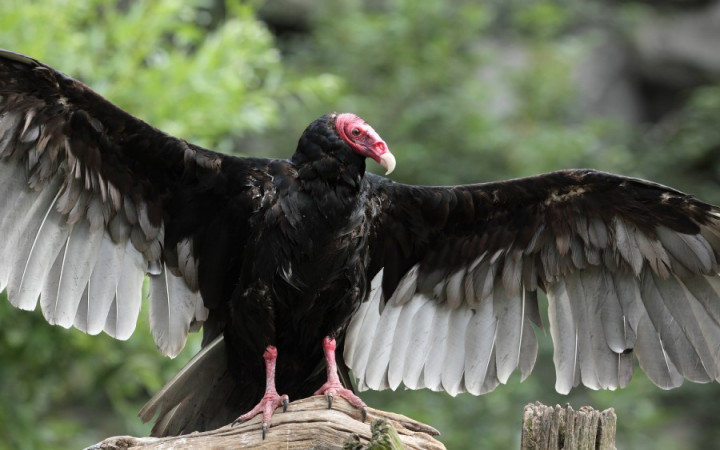Hey! What's that…up ahead…there in the middle of the road? As you're riding down the highway, you spy several large black objects in the middle of the road. Those aren't supposed to be there!
As you get closer, you see them moving. They're animals! What's going on here? When your vehicle gets even closer, you recognize that they're large birds. You also see that there's something else lying in the road that has attracted these birds to a dangerous spot in the middle of the highway.
When you're nearly upon them, the birds fly up into the air out of the way. You pass by the carcass of a dead animal. It's roadkill! And that means those large birds of prey must be vultures! The sight of the dead, rotting animal carcass makes your stomach turn.
How can vultures eat roadkill? The mere sight of the carcass turns your stomach, so how can eating that carcass not give vultures a belly ache?
Vultures are indeed scavengers that feast regularly upon the carcasses of dead animals, also known as carrion. While this behavior may seem disgusting to humans, we should actually be thanking vultures for the important job they do for our environment.
Vultures are like nature's cleaning crew. Animals get hit by automobiles. They also die from predator attacks, diseases, and even natural causes in the wild. Our world would be a whole lot messier if all these animal carcasses were left to decompose.
By eating carrion, vultures clean up the environment and help to prevent the spread of diseases. When a group of vultures eats a freshly-killed animal, they prevent dangerous bacteria and other microbes from spreading through the environment.
How can vultures stand to eat carrion, though? If we humans were to eat carrion, we would get severely ill. We might even die if the carrion was infected with deadly pathogens, such as anthrax, cholera, botulism, or salmonella.
Vultures don't get sick, though. In fact, they thrive on their steady diet of carrion. Their first secret is that they, too, try to avoid rotting meat. Vultures prefer carrion that has only recently been killed. As carrion gets older and turns especially rotten, vultures will avoid it and look for fresher meat.
Even freshly-killed meat can contain plenty of diseases, though. Vultures fortunately possess a very strong immune system and a stomach like iron. In fact, a vulture's stomach acid has a pH level near zero, which is similar to that of battery acid!
The vulture's extremely acidic stomach kills most bacteria and parasites before they ever reach the bird's intestines. Recent studies of vultures' intestinal microbes found that two types of microbes tend to thrive: Clostridia, which can produce toxins like botulism, and Fusobacteria, which can be flesh-eating. Researchers believe the presence of these microbes in vultures reveals that they have become immune to many pathogens and toxins, which allows them to thrive on carrion.





